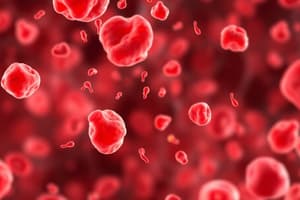Podcast
Questions and Answers
What is the primary cause of megaloblastic anemia?
What is the primary cause of megaloblastic anemia?
- Rapid growth periods like infancy
- Drugs and certain medications
- Vitamin B12 deficiency or folate deficiency (correct)
- Decreased oxygen delivery to vital organs
Which of the following is NOT a common symptom of megaloblastic anemia?
Which of the following is NOT a common symptom of megaloblastic anemia?
- Pale skin, lips, and fingernails
- Rapid heartbeat
- Fatigue and weakness
- Fever (correct)
What is the primary diagnostic feature of megaloblastic anemia?
What is the primary diagnostic feature of megaloblastic anemia?
- Vitamin B12 or folate deficiency
- Low red blood cell count
- Decreased oxygen delivery to vital organs
- Presence of megaloblasts in peripheral blood smears (correct)
If left untreated, what is a potential complication of megaloblastic anemia?
If left untreated, what is a potential complication of megaloblastic anemia?
What is the role of vitamin B12 and folate in the development of megaloblastic anemia?
What is the role of vitamin B12 and folate in the development of megaloblastic anemia?
Which of the following is NOT a common symptom of megaloblastic anemia?
Which of the following is NOT a common symptom of megaloblastic anemia?
What is the purpose of a Schilling test?
What is the purpose of a Schilling test?
In cases of folate deficiency, what type of supplements are typically prescribed?
In cases of folate deficiency, what type of supplements are typically prescribed?
What is a common treatment for vitamin B12 deficiency?
What is a common treatment for vitamin B12 deficiency?
How can megaloblastic anemia be prevented?
How can megaloblastic anemia be prevented?
What may be necessary in severe cases of megaloblastic anemia to treat anemia symptoms?
What may be necessary in severe cases of megaloblastic anemia to treat anemia symptoms?
What should individuals do if they suspect megaloblastic anemia or any other form of delayed erythroblast maturation anemia?
What should individuals do if they suspect megaloblastic anemia or any other form of delayed erythroblast maturation anemia?
Flashcards are hidden until you start studying
Study Notes
Introduction
Megaloblastic anemia is one of the anaemias associated with delayed erythroblast maturation. It is characterized by the presence of megaloblasts in peripheral blood smears, which are abnormal large immature red blood cells. This condition can lead to complications if left untreated, including decreased oxygen delivery to vital organs, stroke, heart failure, and death. This article will discuss the cause, symptoms, diagnosis, treatment, and prevention strategies for megaloblastic anemia.
Cause
Megaloblastic anemia is primarily caused by vitamin B12 deficiency or folate deficiency, although other causes such as drugs and certain medications have also been identified. These nutrients play crucial roles in DNA synthesis, cell division, and oxygen transport, particularly during rapid growth periods of the body like infancy. If the body does not receive enough vitamin B12 or folate, it cannot produce healthy red blood cells, leading to anemia.
Symptoms
Common symptoms of megaloblastic anemia include:
- Fatigue and weakness
- Shortness of breath
- Pale skin, lips, and fingernails
- Rapid heartbeat
- Neuropathy
- Hyperventilation
- Warm extremities
- Diarrhea
- Abdominal pain
- Headaches
Diagnosis
The diagnosis of megaloblastic anemia is typically based on the presence of megaloblasts in peripheral blood smears, along with symptoms and a history of vitamin B12 or folate deficiency. Additional tests that may be ordered include:
- Schilling test: This test measures the body's ability to absorb vitamin B12 and can help diagnose vitamin B12 deficiency.
- Folate levels test: This test measures the level of folate in the blood.
- Vitamin B12 levels test: This test measures the level of vitamin B12 in the blood.
Treatment
Treatment for megaloblastic anemia depends on the underlying cause. For vitamin B12 deficiency, oral supplements or injections of vitamin B12 are generally prescribed. For folate deficiency, folic acid supplements are often recommended. In severe cases, blood transfusion may be necessary to treat anemia symptoms.
Prevention
Preventive strategies for megaloblastic anemia include maintaining a balanced diet rich in vitamin B12 and folate, as well as ensuring adequate intake of these nutrients through dietary supplements if necessary. Regular medical check-ups can also help in early detection and treatment of any underlying deficiencies.
Conclusion
Megaloblastic anemia is a serious condition that can lead to severe complications if left untreated. Understanding its causes, symptoms, diagnosis, treatment, and prevention strategies can help individuals and healthcare professionals manage this condition effectively. If you suspect megaloblastic anemia or any other form of delayed erythroblast maturation anemia, consult a healthcare professional immediately for proper diagnosis and treatment.
Studying That Suits You
Use AI to generate personalized quizzes and flashcards to suit your learning preferences.



